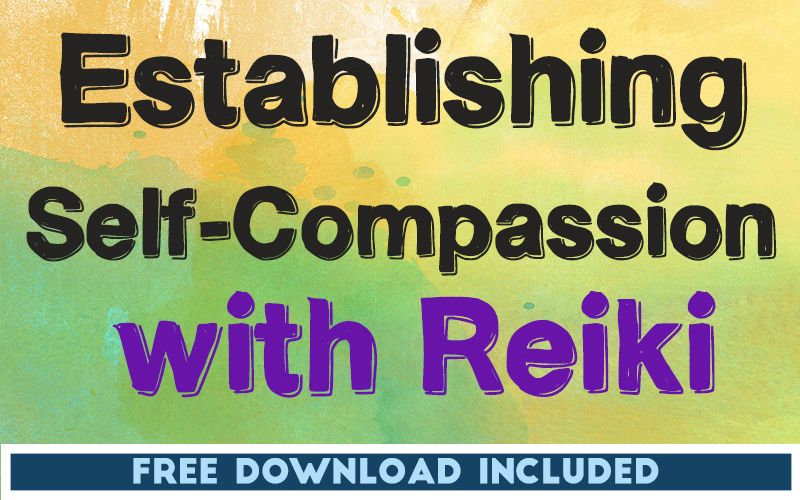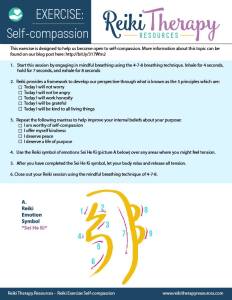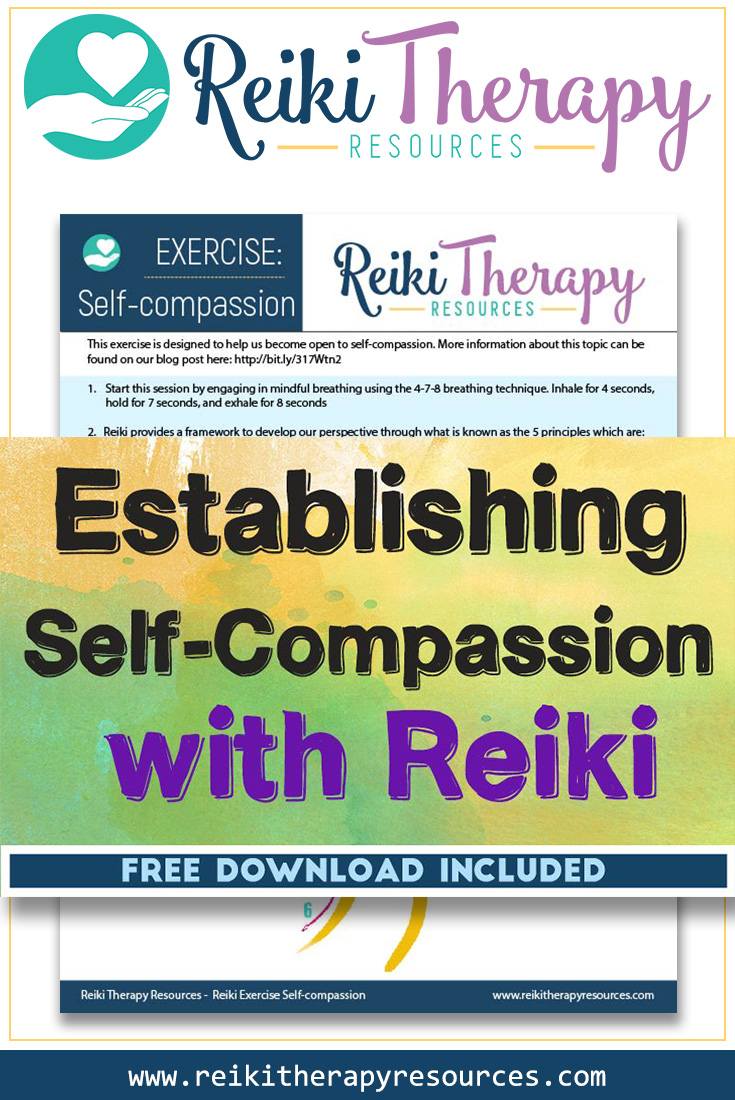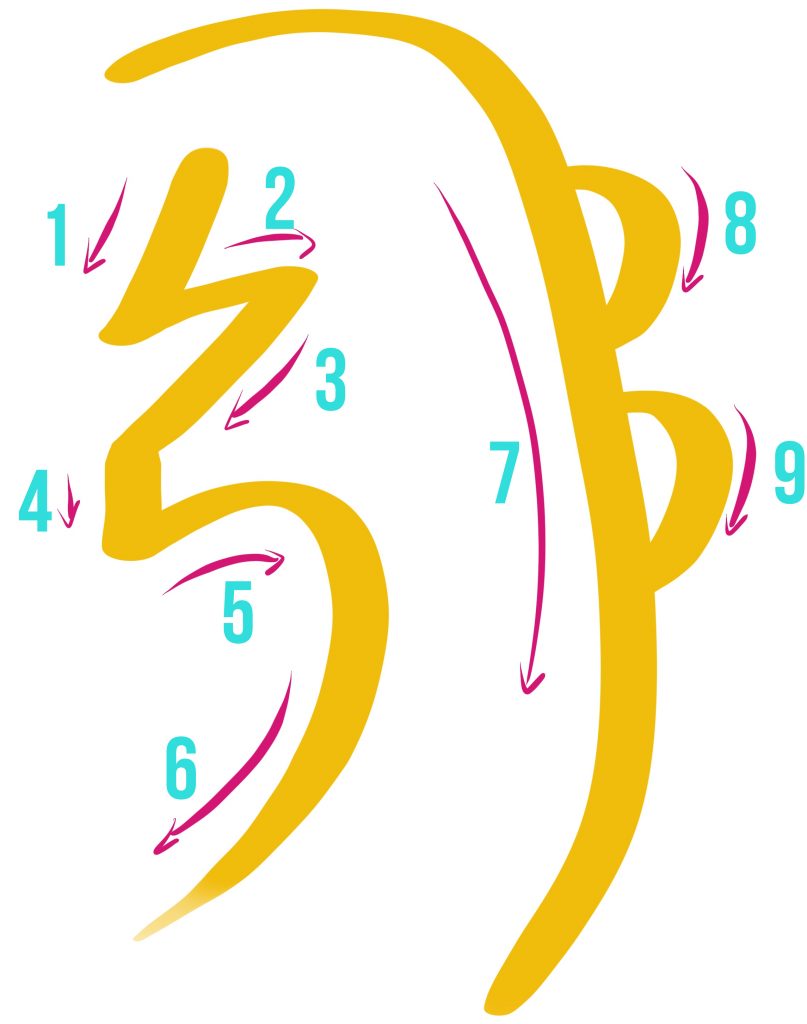
THIS POST INCLUDES:
——————————————–
1. What is Self-compassion
2. Benefits of Self-compassion
3. Self-compassion Checklist
4. Pay Attention to your Reaction
5. Free Download Reiki Self-compassion Exercise
WHAT IS SELF- COMPASSION
Self-compassion is recognizing our suffering and extending kindness towards ourselves to alleviate our suffering.
Self-compassion is internally based on the messages we tell ourselves through thoughts. We can externalize self-compassion through activities and outward expression of kindness through important physical self-care like looking after our health.
Self-compassion means being kind to ourselves especially when we are feeling vulnerable. During these times we already feel bad about our situation and consequently, we may feel bad about ourselves. At these times it can be difficult to extend a hand of kindness and compassion to our situation and our reactions to the situation.
It is helpful to develop awareness around the way we treat ourselves internally and externally. This awareness can help us develop more beneficial self-care actions to cope with our experiences.
BENEFITS OF SELF-COMPASSION
Self-compassion helps improve our wellbeing and mental health by giving us skills to reduce our internal thoughts that contain negative self-criticism. Self-compassion encourages us to maintain an open mind about our circumstances and experiences and how we react to those experiences.
Through self-compassion we can view our thoughts and emotions as ‘normal’. This can provide a more accepting approach to processing difficult emotions.
If we extend self-compassion to ourselves when we make mistakes, we can see that acknowledging our mistakes helps resolve conflict quicker compared to holding a defensive and self-criticizing approach.
Self-compassion invites us to stop judging ourselves as ‘bad’ or ‘good’ and allows us the space to explore our understanding of our behavior and emotions.
SELF-COMPASSION CHECKLIST
To gain insight into how self-compassionate you are, review the statements below.
- When something goes wrong I blame myself
- I criticize myself even when things go well
- I don’t look after myself when I am experiencing a difficult time
- I focus on my faults
- I am disappointed in myself if I make a mistake
- I don’t treat myself with much kindness when I am struggling
- I find it difficult to accept my mistakes
- I think a lot about things I don’t like about myself
- I feel like I struggle with most things
Providing self-compassion can require a change from criticism to self-care. Engaging in self-compassion may be uncomfortable if you struggle with negative beliefs around self-pity.
With practice, you can make some improvements and increase your overall wellbeing by engaging in more self-compassion
PAY ATTENTION TO YOUR REACTION
The effects of a Reiki session can be felt immediately after the session as well as some time after. Each person’s response is different. Often, we will look for proof of mental or physical changes in response to Reiki treatment, however, much of our inner is conducted at the subconscious level. We typically use our conscious thoughts to inquire, investigate and rationalize thoughts. In the case of Reiki, much of the healing is done outside of our own conscious efforts and therefore can be difficult for us quantify.
The impact of a Reiki session may be felt in the way you feel about your perception of a situation or event that follows your Reiki session. You may feel more relaxed and calmer and more present with where you are. Your sense may be more heightened with touch, taste, and sight. If you are going through an emotional transition, you may feel liberated from emotional repression. You may feel dehydrated and tired and should hydrate with water soon after your session.
These effects can normally last from hours up to 2 days after your session.
Remain open to the effects of your Reiki session and understand that your body and mind are working in tandem with the energy flow of Reiki.
You can spend some time after your session reflecting on your emotions, thoughts and physical response to the Reiki session. Use this time to write in a journal or record your thoughts somehow. You may want to meditate, create art, go for a gentle walk in nature. Participating in kind and loving self-care for yourself after your Reiki session will help extend the benefits that you receive from Reiki.
REIKI SELF-COMPASSION EXERCISE
This exercise is designed to help us become open to self-compassion:
- Start this session by engaging in mindful breathing using the 4-7-8 breathing technique. Inhale for 4 seconds, hold for 7 seconds, and exhale for 8 seconds
- Reiki provides a framework for us to develop our perspective in life through what is known as the 5 principles which are:
- Today I will not worry
- Today I will not be angry
- Today I will work honestly
- Today I will be grateful
- Today I will be kind to all living things
- Repeat the following mantras to help improve your internal beliefs about your purpose:
- I am worthy of self-compassion
- I offer myself kindness
- I deserve peace
- Use the Reiki symbol of emotions Sei He Ki (picture A below) over any areas where you might feel tension.
- After you have completed the Sei He Ki symbol, let your body relax and release all tension.
- Close out your Reiki session using the mindful breathing technique of 4-7-8.
FREE DOWNLOAD
SIGN UP below to receive your FREE DOWNLOAD. Once you enter your email address, you will receive access to the Free Reiki Self-compassion Exercise.

BUILD YOUR REIKI REFERENCE MATERIALS:
Pin this image to your Pinterest board.

SHARE KNOWLEDGE & PASS IT ON:
If you’ve enjoyed this post, please share it on Facebook, Twitter, Pinterest. Thank you!

